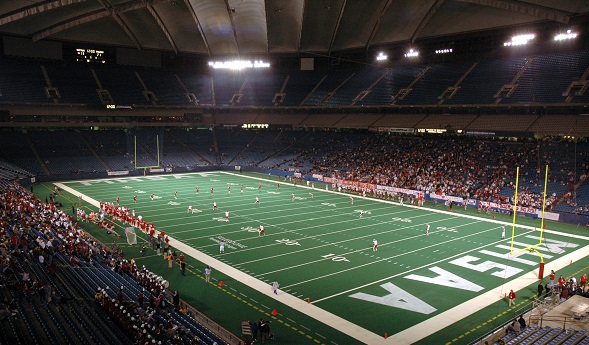
Farewell Silverdome; Our Memories Live On
By
Ron Pesch
MHSAA historian
November 28, 2017
Farewell Pontiac Silverdome.
In early December, more than 15 years after the Detroit Lions played their last game beneath its air-supported Teflon-paneled roof, the “Dome” will take a last breath and then depart.
Finally.
The last few years have been cruel to the stadium that was once a gem and the home of dreams.
The Lions arrived at the newly opened “Pontiac Metropolitan Stadium” (or “Ponmet” as it was called by enthusiasts of the new structure) in August 1975. It was renamed “Pontiac Stadium” later in the year by the city council, and in October of 1976 the Pontiac council again re-christened the building as the “Pontiac Silverdome.”
“We feel the new name better conveys the image of our facility,” said Charles McSwigan, Jr., stadium executive director, at the time. “It certainly lets everyone around the country know we have a modern year-round domed stadium.”
The move was primarily marketing motivated. “The other three giants, Super, Astro and King, get all the publicity,” added McSwigan, further explaining the change. “Promoters call them, but they don’t even come near us.”
Launched in 1975, the MHSAA football championship games were played outdoors at college stadiums that first year on the Saturday before Thanksgiving. While deemed a success, the games were played at two different sites. That had presented challenges.
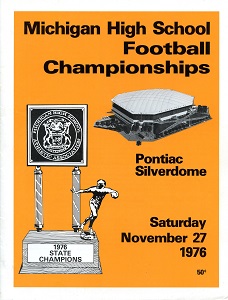 Following that first year, consideration was given to the new structure in Pontiac.
Following that first year, consideration was given to the new structure in Pontiac.
“There are some problems,” remarked Al Bush, MHSAA executive director, explaining the logistics of a possible move to the NFL stadium. “For instance, it would be difficult to play four games on the same day. We would have to start early in the morning, and the last game would have to start late at night.”
Competition for attendance with various events, including deer hunting season, and college football – especially the televised University of Michigan-Ohio State game – were factors to be considered. The high school football playoffs were still a new product without a tradition. Finances also were an area of worry. It was estimated that a crowd of between 20,000 and 25,000 would be needed to make the jump economically feasible.
So, it was with great caution and trepidation that the move was made indoors to Pontiac. Initially, the contract was for a single year. The games would be played on the Saturday following Thanksgiving. By all measures, to the delight of all involved, the 1976 championships were a huge success.
“The four state championship games, which were played in the Silverdome in two sessions on Saturday, drew a paid attendance of 29,423 fans,” said Associated Press writer Harry Atkins in a follow-up piece following the games, “bringing smiles of relief and joy to MHSAA Executive Director Al Bush and his assistant, Vern Norris. The attendance figure was almost double the number of fans who turned out last year in ice box-like weather at two sites – Western Michigan University and Central Michigan University.”
With that, a new contract was signed, and for 29 years the city of Pontiac served as home to the MHSAA 11-player football championships. “Goin’ to the Dome” soon became the goal of every high school in Michigan that offered the sport.
Following a 15-10 victory over the Dallas Cowboys in early January 2002, the Lions departed the Silverdome for Ford Field, located in downtown Detroit. The high school Finals stayed put for three more years before moving to Ford Field.
Twelve seasons after following the Lions from Pontiac to Detroit, countless memories and several MHSAA championship game records still stand from those years under the Dome.
Four championship games were played at the Silverdome to close each season from 1976-90. In 1991, the playoffs were expanded to eight classifications and the Finals expanded to eight games over a two-day showcase.
For many across Michigan, those 176 high school state title games were their first live exposure to the building many had only seen on television. For football fans, the MHSAA Finals provided an affordable and unique chance to visit the stadium and watch the game between the 20-yard-lines at ground level. An NFL game, concert, or in later years a Pistons basketball game at the Silverdome was far from an intimate experience for most. Seating 80,311, it was the largest stadium in the NFL until 1997.
For thousands of athletes and coaches, the playing surface was their first exposure to artificial turf. It was an honor to set foot on the field. After all, who didn’t want to run on the same canvas on which Lions legend Barry Sanders painted?
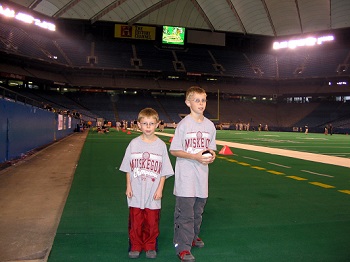 Who can forget the Mill Colemen-led comeback drive to title glory in the final minutes as Farmington Hills Harrison downed DeWitt for the Class B title in 1989, or “The Catch” by Muskegon Reeths-Puffer’s Stacy Starr that broke the hearts of Walled Lake Western players and fans in the final seconds in Class A in 1992? Who remembers the wild 91 points (and 883 yards in total offense) posted in Belding’s 50-41 victory over Detroit Country Day in Class B in 1994, when Belding trailed by 19 points at the half? The combined final score remains the record for most points tallied in a title game by two teams.
Who can forget the Mill Colemen-led comeback drive to title glory in the final minutes as Farmington Hills Harrison downed DeWitt for the Class B title in 1989, or “The Catch” by Muskegon Reeths-Puffer’s Stacy Starr that broke the hearts of Walled Lake Western players and fans in the final seconds in Class A in 1992? Who remembers the wild 91 points (and 883 yards in total offense) posted in Belding’s 50-41 victory over Detroit Country Day in Class B in 1994, when Belding trailed by 19 points at the half? The combined final score remains the record for most points tallied in a title game by two teams.
Farmington Hills Harrison and coach John Herrington won five consecutive finals in Pontiac (1997, 1998, 1999, 2000, 2001), and 12 of their 13 MHSAA Finals titles at the Silverdome. A total of 12 of Detroit Catholic Central’s 17 trips to the Finals meant a bus ride to Pontiac.
One record performance set in the opening game of the 1976 championships still stands in the MHSAA championship record book. With the evolution of the game, it may never fall.
Despite the climate-controlled environment afforded by moving indoors, Crystal Falls Forest Park threw only three passes against Flint Holy Rosary in the Class D title game, completing one for a net -3 yards. By default, that total established a record for pass defense in a title game. It remains the zenith.
Forest Park had little need for the pass that day. The Trojans rolled up 234 rushing yards on 48 carries, including a 74-yard touchdown run off left tackle by all-state running back Marty Ball with 4:36 to play in the first quarter. Less than two minutes later, a fumble recovery by Forest Park’s Charlie Davis was returned 25 yards for a score, and the Trojans led, 14-0. Holy Rosary passed for 204 yards including an 18-yard pass from Ron Fray to Dan Lehoux in the second quarter, but couldn’t overcome that first quarter deficit, falling 14-6. A crowd of 14,879 attended the day’s first session, comprised of the Class D and Class A games.
Other long-standing record performances at the Dome still can be spotted in the record book.
Josh Wuerfel’s 46-yard field goal in the second quarter gave Traverse City a 10-0 halftime lead and aided the second-ranked Trojans’ 24-14 defeat of top-ranked Detroit Catholic Central in the 1988 Class A contest. The kick stood for 28 years as the title game record before finally being exceeded (twice!) at the 2016 championships played at Ford Field. Liam Putz of Grand Rapids West Catholic shattered the mark with a 47-yarder against Menominee in the Division 5 title game, before Ben Fee of Orchard Lake St. Mary’s topped the kick in the eighth game of the weekend. Fee’s 49-yard field goal late in the fourth quarter helped St. Mary’s down Muskegon 29-28 in the Division 3 thriller. The boot was his third field goal of the game. Combined with two extra points, he finished as the Eaglets’ top scorer.
Paul Gross of Jackson Lumen Christi established a new mark for extra points against Livonia Clarenceville in the 2001 Division 5 game, connecting accurately on all seven of his attempts. The record has been matched twice since the move to downtown Detroit.
Nick Williams’ 90-yard touchdown dash on Farmington Hills Harrison’s first play from scrimmage in the 1994 Class A game, a 17-13 victory over Grand Rapids Forest Hills Central, still tops the record book category for longest run play in a title game. An 89-yard TD run by Constantine’s Jim Schragg sits directly behind the Williams’ mark. Schragg rolled up 307 yards in a 34-13 win over Suttons Bay in the 2004 Division 6 game, during the final year at the Silverdome. His total established the pinnacle for rushing yards in a game.
Ravenna’s Benny Clark carried the ball 49 times (including 29 rushes in the second half) for 212 yards as the Bulldogs topped Morenci 30-14 in the 1996 Class C contest. The total, which exceeded the previous mark of 40 set by Dan Lato of Crystal Falls Forest Park in 1977, has yet to be matched or exceeded.
The fastest championship game passing touchdown came 15 seconds into the 2003 Division 5 Final, when Jackson Lumen Christi‘s Tyler Aldridge found wide-open Matt Russell on a reverse pass on the second play from scrimmage. The Titans defeated Muskegon Oakridge 23-0 for the title.
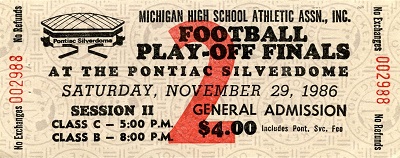 Quarterback Tony Koshar tossed a short pass to Jim Steinman, “who shed a tackler and managed to stay in bounds as he took off for the end zone on a 96-yard scoring play,” as Gobles grabbed a 31-22 upset victory over top-ranked Crystal Falls Forest Park in the 1984 Class D title game. The reception for the longest pass play lasted 24 years before it was finally topped in 2008.
Quarterback Tony Koshar tossed a short pass to Jim Steinman, “who shed a tackler and managed to stay in bounds as he took off for the end zone on a 96-yard scoring play,” as Gobles grabbed a 31-22 upset victory over top-ranked Crystal Falls Forest Park in the 1984 Class D title game. The reception for the longest pass play lasted 24 years before it was finally topped in 2008.
Kirk Williams’ 15 pass receptions for DeWitt against East Grand Rapids in the 2002 Division 3 contest still stand the test of time, as does Brad Johnson’s 87-yard punt return for a touchdown for Schoolcraft against Frankfort in the 1988 Class D championship game.
The 1991 title games saw two defensive marks set, both on the same day. On Saturday, November 30, Rick Marcotte of Lake Linden-Hubbell scooped up a fumble and dashed 79 yards for a touchdown and a new Finals record versus Mendon in Class DD. Less than 16 hours earlier Nate Cierlak of Muskegon Catholic Central had set the mark with a 56-yard return for a TD against Harbor Beach. In that year’s Class CC Final against Negaunee, Jason Livengood of Battle Creek Pennfield set the one mark that statistically can never be topped when he returned a pick-six for 100 yards.
Eight punts by Muskegon’s Jason Crago in the Big Reds’ 16-13 victory over Detroit Martin Luther King in the 1989 Class A title game was unmatched until 2007, when Aaron Hudson of Blissfield equaled the total. On Saturday, Clarkston’s Jermaine Roemer also tied the record in the Division 1 Final.
Between 1976 and 2004, more than 1.5 million fans attended the games in Pontiac, with a peak of attendance of 71,156 in 1995.
Soon the site will be cleared, with plans for redevelopment. Not far down the road, The Palace of Auburn Hills, once home to the MHSAA Basketball Finals and longtime home to the MHSAA Individual Wrestling Finals, will be scrubbed from the earth. Along with them, the structural evidence of the home of countless accomplishments will disappear.
Change is constant, and time moves on. Still those achievements, and several others, live on in the pages of the MHSAA record book, in the memories of those who competed and the recollections of those who played witness.
 Ron Pesch has taken an active role in researching the history of MHSAA events since 1985 and began writing for MHSAA Finals programs in 1986, adding additional features and "flashbacks" in 1992. He inherited the title of MHSAA historian from the late Dick Kishpaugh following the 1993-94 school year, and resides in Muskegon. Contact him at [email protected] with ideas for historical articles.
Ron Pesch has taken an active role in researching the history of MHSAA events since 1985 and began writing for MHSAA Finals programs in 1986, adding additional features and "flashbacks" in 1992. He inherited the title of MHSAA historian from the late Dick Kishpaugh following the 1993-94 school year, and resides in Muskegon. Contact him at [email protected] with ideas for historical articles.
PHOTOS: (Top) Constantine and Suttons Bay played in the Division 6 Final at the Silverdome as part of the last weekend of MHSAA games in the building in 2004. (Top middle) The 1976 program welcomed Finals fans to the Dome for the first time. (Bottom middle) The author's children during a trip to the Silverdome before the Finals moved to Ford Field. (Below) The 1986 Finals ticket got fans into two games at the Silverdome for $4. (Photos courtesy of Ron Pesch and MHSAA files.)
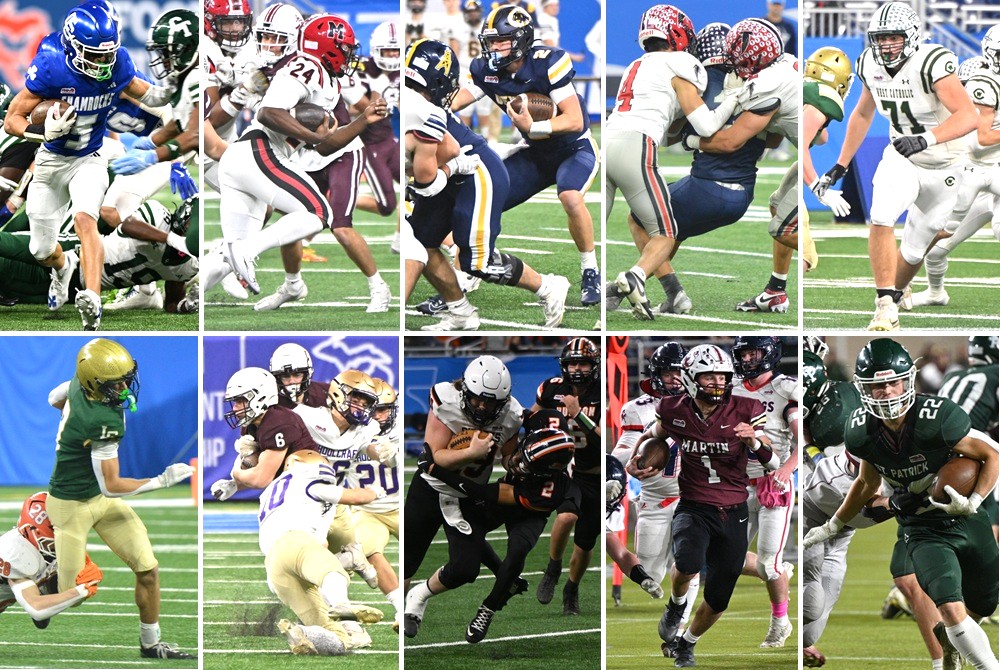
1st & Goal: 2025 Football Finals Review
By
Geoff Kimmerly
MHSAA.com senior editor
December 3, 2025
This season’s MHSAA Football Finals saw only two of 20 teams reach championship games for the first time – the lowest number of first-timers since the start of the 2020s – but several more play for Finals titles for the first time in a decade, or two, or even three or four.
 Dearborn Divine Child won its first championship since 1985, Portland St. Patrick its first since 1992, and Harbor Beach, Menominee and Detroit Catholic Central all claimed their first titles in more than a decade as this fall came to a close over the last two weekends.
Dearborn Divine Child won its first championship since 1985, Portland St. Patrick its first since 1992, and Harbor Beach, Menominee and Detroit Catholic Central all claimed their first titles in more than a decade as this fall came to a close over the last two weekends.
We also had repeat winners – Orchard Lake St. Mary’s, Jackson Lumen Christi and Martin – and although their runs ended in defeat, Blanchard Montabella and Dexter did advance to championship weekends for the first time.
MHSAA.com once again covered all 10 championship games, with quick recaps and links to those stories below followed by notations of performances entered into the MHSAA Finals record books and a report on some of the main storylines to emerge as those championships were being decided.
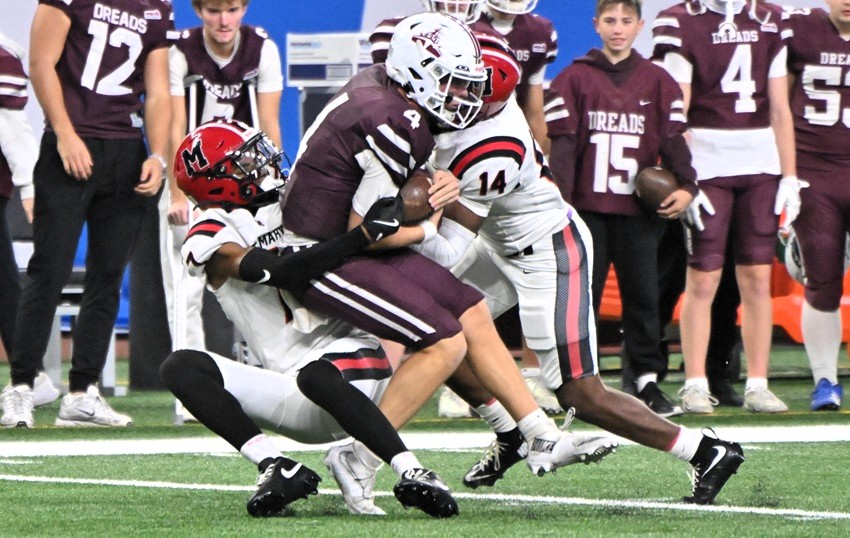
Finals in Review
11-Player Division 1: Detroit Catholic Central 42, Detroit Cass Tech 19 – Read
DCC claimed its first Finals championship since 2009 by emerging from this matchup of undefeated teams and avenging a 2024 Semifinal loss to eventual champion Cass Tech. While Shamrocks senior Samson Gash has received some of the highest statewide praise for his offensive talents this season, junior brother Gideon Gash starred this time with three touchdown catches all 37 yards or longer.
11-Player Division 2: Orchard Lake St. Mary’s 51, Dexter 14 – Read
Orchard Lake St. Mary’s repeated as Division 2 champion following quarterback Jabin Gonzales (304 yards/4 TDs passing, 102 yards rushing) but also thanks to a stellar defensive effort against the Dreadnaughts’ record-setting offensive attack. The Eaglets held Dexter to just 266 total yards, and only 69 during the second half after taking a 24-14 lead into the break.
11-Player Division 3: DeWitt 54, Mount Pleasant 20 – Read
This was another matchup of undefeated contenders, and DeWitt again lit up the scoreboard in winning its second championship. The Panthers set a team Finals record for most rushing yards (575) with senior Traverse Moore claiming the individual Finals rushing record with 397 – 83 more than the previous all-time best.
11-Player Division 4: Dearborn Divine Child 23, Hudsonville Unity Christian 22 – Read
Divine Child’s first Finals championship since 1985 was a product of steady play on both sides of the ball. Offensively, Marcello Vitti ran 19 times for 120 yards and a score and Drew Sheridan completed 19 passes for 241 yards and two touchdowns. Defensively, Divine Child stopped a two-point conversion try midway through the fourth quarter to keep a one-point lead, then held Unity to two yards on its final possession.
11-Player Division 5: Grand Rapids West Catholic 42, Pontiac Notre Dame Prep – Read
West Catholic jumped out to a 28-0 lead and didn’t allow reigning champion Notre Dame Prep to get on the scoreboard until the final minute of the first half. The 1-2 punch of running back Collin Abram and quarterback Grady Augustyn accounted for a combined 347 yards for the Falcons, and the Fighting Irish also lost all-state quarterback Sam Stowe for the majority of the second half with an injury.
11-Player Division 6: Jackson Lumen Christi 28, Kingsley 15 – Read
The Titans claimed a fourth-straight Finals championship and repeat in Division 6 by scoring the game’s only second-half points – 14 to go ahead and stay there during the fourth quarter. Lumen Christi’s Sean Walicki starred on both sides of the ball, running for 142 yards and two touchdowns and making 17 tackles.
11-Player Division 7: Menominee 34, Schoolcraft 6 – Read
Two years after finishing Division 7 runner-up and only four points shy of Lumen Christi in that title decider, Menominee returned to Ford Field and won its first championship since 2007. Clayton Miller ran for 112 yards and three touchdowns for the Maroons, who finished a perfect 14-0. Schoolcraft’s only points came with 6:09 to play.
11-Player Division 8: Harbor Beach 31, Hudson 20 – Read
The 11-Player Finals opened with a matchup of undefeated contenders. Harbor Beach withstood Hudson’s powerful running attack and followed quarterback Caden Bucholtz (146 yards/1 TD rushing, 82 yards/2 TDs passing) to its first Finals title since 2012. The Pirates took a 21-0 lead into the final four minutes of the first half and got a scoring run, touchdown reception and 20-yard field goal from Skiler Kruse.
8-Player Division 1: Martin 52, Blanchard Montabella 8 - Read
Hudson claimed its third Division 1 title in four seasons with a dominating performance, as Montabella scored the game’s first points but were held off the board the rest of the way. Quarterback Haylen Buell ran for 179 yards and three touchdowns on only nine carries, and completed all seven of his passes – including one for another score – for the undefeated Clippers.
8-Player Division 2: Portland St. Patrick 53, Felch North Dickinson 0 – Read
The Shamrocks seemed to set the tone on the opening kickoff – returning it to North Dickinson’s 3-yard line – on the way to winning their first 8-player championship and first in either football format since 1992. St. Patrick led 20-0 after just seven minutes and 33-0 at halftime, with seven players reaching the end zone at least once by the end of the contest.
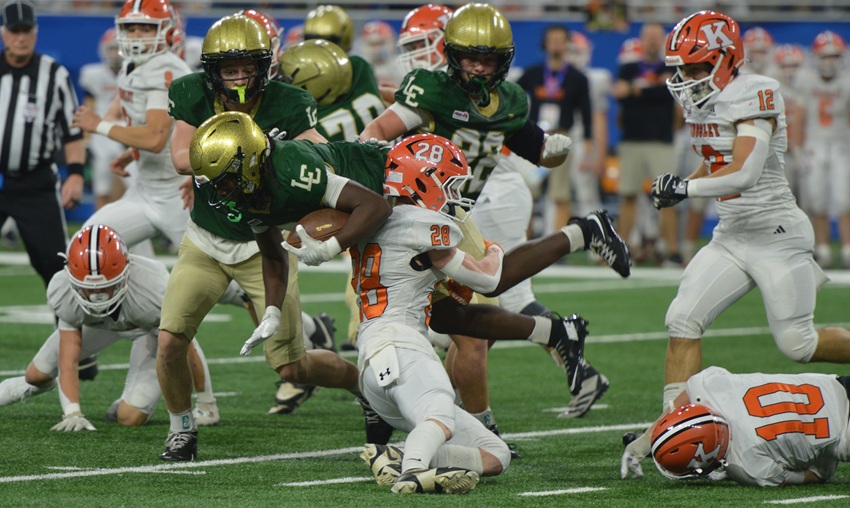
Record Report
Detroit Catholic Central and Jackson Lumen Christi moved into a first-place tie with Farmington Hills Harrison for 11-Player Finals appearances as all three have played in 18. (Harrison closed in June 2019).
DeWitt senior Traverse Moore earned seven 11-Player Finals record book listings, his most notable for an all-time best 397 yards rushing – which broke Kadale Williams of Lumen Christi’s record of 314 set just last season. Moore also set records with three touchdown runs during the first quarter, and his 461 total yards (including 64 passing) are the second-most in Finals history. He made four more lists as well, including for 24 points scored.
Mount Pleasant quarterback Xavier Creguer also set a record during the Division 3 game, his 91-yard scoring run the longest rush in 11-player championship game history.
Three kickers made the 11-player single-game extra points list with six apiece – Orchard Lake St. Mary’s Beckett Keifer in Division 2, DeWitt’s Vincent Rose in Division 3 and Grand Rapids West Catholic’s Landon Smith in Division 5
A trio of quarterbacks also made 11-player record lists. Orchard Lake St. Mary’s Jabin Gonzales did so with 304 yards passing, his four touchdown tosses, and 406 total yards (including 102 rushing); the total yards rank eighth all-time. Detroit Cass Tech’s Donald Tabron II made passing lists with 25 completions, 37 attempts and 285 yards, and Dearborn Divine Child quarterback Drew Sheridan also made the completions list with 19. Tabron’s attempts rank eighth, and his completions tied for fourth on that list.
On the receiving end of some fine quarterback play, Cass Tech’s Corey Sadler Jr. made the 11-player single-game receptions list with 11, tying for third-most catches, while Grand Rapids West Catholic’s Thomas Puksta made the single-game receiving yardage list with 161 and Detroit Catholic Central’s Gideon Gash tied for the second-most touchdown receptions with three.
Dexter’s Cole Novara rewrote the season receiving records this fall, and added an 11-player championship game listing with a 96-yard kickoff return touchdown. St. Mary’s Daniel Taylor Jr. also made a return list, bringing back a fumble 59 yards for a score.
DeWitt with 54 points made the 11-player team single-game scoring list, but that was just the start. The Panthers’ 575 rushing yards and 639 total yards were records, their seven rushing touchdowns tied another one, their 24 first downs made a record list and their combined 959 total yards with Mount Pleasant made the total offense list for both teams in one game.
Orchard Lake St. Mary’s also made the 11-player scoring list with 51 points, and earned another entry with 314 passing yards. Dexter made the single-game completions list in that game with 24, and Detroit Cass Tech made that same list with 25 completions. Hudsonville Unity Christian made the single-game rushing carries list with 66.
Grand Rapids West Catholic tied the Finals record with two other teams by returning two interceptions for touchdowns.
Hudson made the list of teams that did not punt in a Final, and also joined Harbor Beach – which punted once – on the list for fewest punts by both teams combined in one game.
Martin quarterback Haylen Buell made the 8-player total yardage list with 313 in the Division 1 game, leading a Clippers attack that also made the single-quarter points list with 30, single-Final rushing list with 364 yards and rushing touchdown list with six.
Portland St. Patrick quarterback Jerryd Scheurer made the list for fastest touchdowns to begin an 8-Player Final, scoring on a run just 20 seconds into his team’s Division 2 win against Felch North Dickinson. St. Patrick also made the single-game touchdowns list with seven.
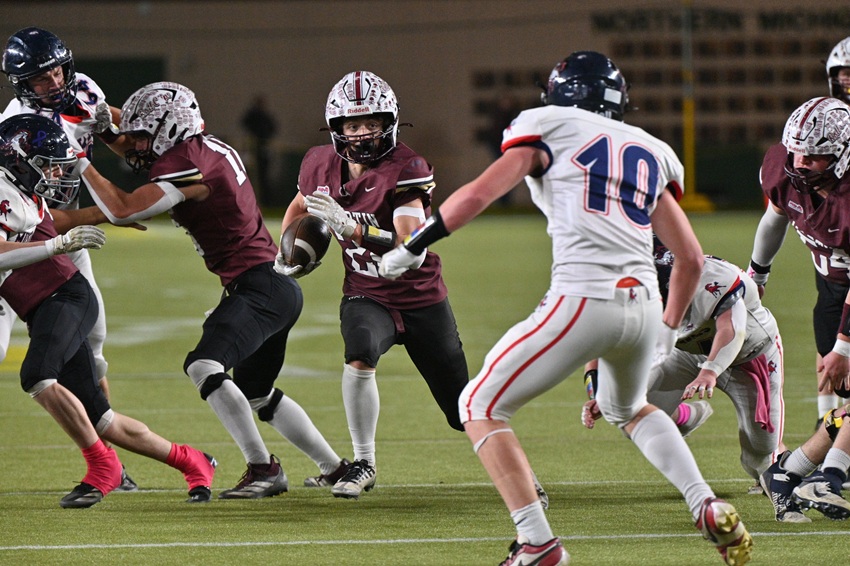
Stories Behind the Scores
Single Wing, Several Records: We detailed above most of how DeWitt ran its way into the Finals record book, but the Panthers’ strategy this season deserves more credit for its brilliance. Recognizing his team’s strength on the offensive line and depth of dynamic ball carriers, DeWitt coach Rob Zimmerman leaned heavily on single wing concepts that saw direct snaps to Traverse Moore – technically his quarterback – who then ran behind multiple blockers or worked through counters and other slights of hand that opened up multiple running lanes on just about every play. The Panthers have added several record book entries over the last 25 years thanks to a high-scoring spread passing attack, but they followed last season’s 702 points (ranking eighth all-time before this fall) with 727 this season that will ran fifth on the single-season scoring list. Moore finished with 2,512 yards and 33 touchdowns rushing, and it will be interesting to see if other programs follow suit by incorporating single-wing looks.
Memorable Menominee: The Maroons were once known as one of the last teams to run the single wing, and although they’ve added different looks and more balance under fourth-year coach Chad Brandt, that tough-running, physical culture lives on – and played a big part in Menominee’s perfect season and first Finals championship since 2007. The Maroons just missed winning the Division 7 title in 2023, losing to Jackson Lumen Christi 34-30, but came through this time to claim the Upper Peninsula’s first 11-player championship since 2015. This season, only 16 UP teams played 11-player, while 19 played 8-player.
Watch List: A total of 44,733 fans attended the 11 or 8-Player Finals this season, the highest combined total for the three days since 2019 and despite a snowstorm that blanketed much of the Lower Peninsula over the 11-player weekend. A notable crowd of fans also watched online; although this was the first year the 11-Player Finals were streamed only, on the NFHS Network, we know that the Division 1 championship game drew the fourth-most viewers all-time of any event from any state broadcast on the Network, and that they watched the game for the most minutes ever for a Network broadcast.
MHSAA.com's weekly “1st & Goal” previews and reviews are powered by MI Student Aid, a division within the Department of Lifelong Education, Advancement, and Potential (MiLEAP). MI Student Aid encourages students to pursue postsecondary education by providing access to student financial resources and information. MI Student Aid administers the state’s scholarship and grant programs that help make college Accessible, Affordable and Attainable for you. Click to connect with MI Student Aid and find more information on Facebook and Twitter @mistudentaid.
PHOTOS (Top) This collage shows action photos from all 10 MHSAA Finals played this season. (2) Orchard Lake St. Mary’s Kareem Pruit (7) brings down Dexter quarterback Cooper Arnedt in 11-player Division 2. (3) Kingsley’s Nolan Hodges (28) wraps up Lumen Christi’s Ayden Gatewood in Division 6. (4) Martin’s Seth Toris (24) charges through a hole with Montabella’s Noah Carlson lining up to attempt a tackle in 8-player Division 1.

